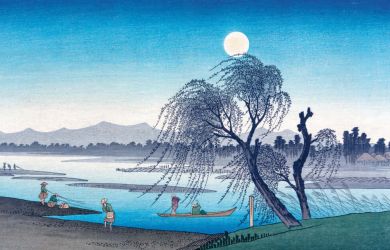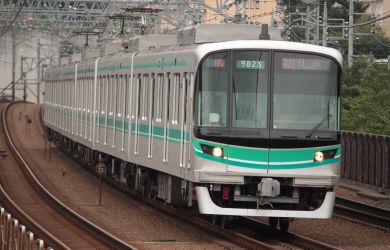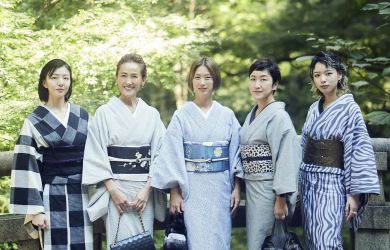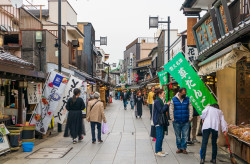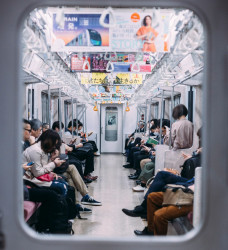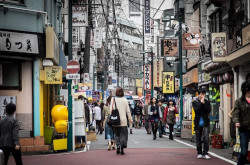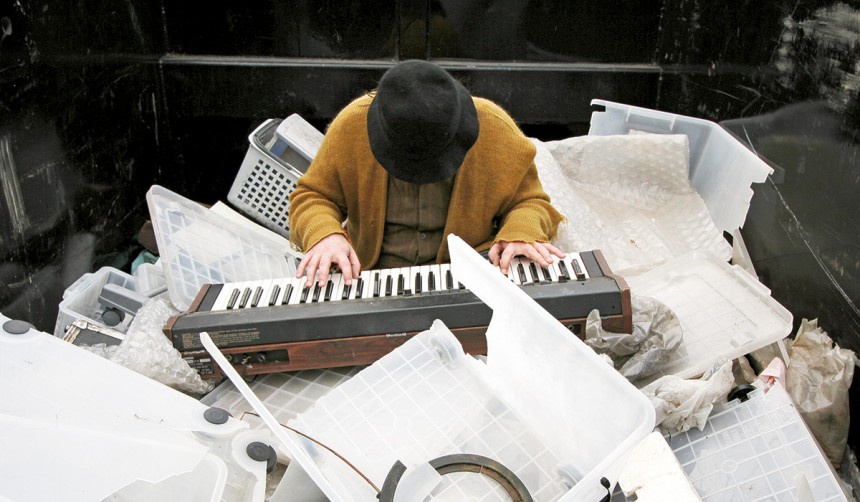
October 23, 2015
The Songs of Jim O’Rourke
The producer and multi-instrumentalist keeps it simple
By the time Jim O’Rourke moved to Tokyo in 2001, he’d amassed a body of work—his own music, as part of Sonic Youth, and as producer—that made him a sought-after figure. A mercurial musician whose music ranges from the melodic to the experimental, O’Rourke now prefers a more uncomplicated life than the one in the commercial record industry. Metropolis reached him in Hokkaido ahead of the debut concert for his new album, Simple Songs.
Where are you and what are you doing?
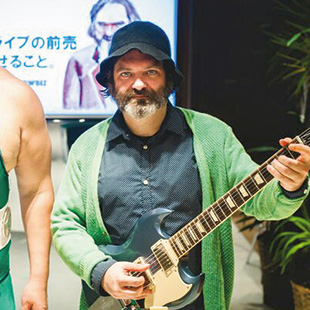
(Photo by Taikou Kuniyoshi)
I’m on tour with [sax player] Akira Sakata in Yakumo for a gig put on by [the] city. People aren’t going to come to see a free jazz show in a place like this. It’s more doing tunes, which is good practice.
Why a solo singer-songwriter album now?
It sounds ridiculous, but if I’d done it by myself I probably never would have put it out. I took about six years to make it and there were three other people who played on recordings we made again and again. The fact I put it out is because I wanted to pay them. But I don’t even know if that will be possible. The last time I put out a record like this was 13 years ago, and the world has really changed—people don’t buy records anymore. So at this point, I still don’t know if I’ll be able to give them any money.
Tickets sales have been good, right?
The concerts sold out in a day or two, which surprised me. It sounds disingenuous, but I don’t care if they sell out or not. I care because I want to pay my musicians, but personally, the only thing that matters is it being better than whatever I’ve done before. This one is really involved because it’s four sets of new stuff. I’m still in the middle of writing it all, so there are going to be a lot of rehearsals. I don’t just want to play the songs on the record—it’s got to be more than that. I don’t want to just do the same show again, which is why I don’t tour as myself. It’s not just the band. If it were just that, it would be fine; but one set’s a jazz band, another a string quartet … so it’s going to be a lot of work. But my way of working is hard for people here to understand.
In what sense?
I’m very particular about things … not that the rhythm is correct, but the sense of rhythm. The hardest thing to get across to musicians here is that tempo does not rule music. The metronome is not tempo; your heartbeat and the air around us are the tempo. Getting them off the metronome is really hard.
Regarding the album title, tell us your thoughts on simplicity in music.
I don’t necessarily have an affection for simplicity in music. I like patience in music, which, in a way, I think of as simple, allowing the material to be itself, as opposed to pushing the sounds around. If I was to think of simplicity in music, it’s just allowing the music to be itself, pared down to the necessities.
Tell us about the creation of the song “Hotel Blue”.
That song was originally written for a Koji Wakamatsu film. He insisted on there being an end roll song for the soundtrack I did. That stuck around as something I thought was worth working on. There were so many songs, and the question was, which made the arc of the record work? And that was probably the last thing we did. In the end, all the sections that weren’t part of the original, I wrote in 20 minutes while everyone was downstairs having a cigarette break. At that point, Wakamatsu had passed away, so I wanted it on the record. He’s a big reason I moved here and finally learned Japanese. The record is dedicated to him.
Do the best songs arrive in epiphanies?
Either that or six to seven years. There’s no “in between” with me; it’s either immediate or takes years of sitting on it. “Last Year” was written eight years ago. Even the basic track is from six years ago. I must have rerecorded it 20 times, and the first was the best. I’m happy to work on things for years and years, because I don’t feel the need to put anything out. It’s got to be right, or there’s no point.
Are they written traditionally on acoustic guitar?
I only write when I have to. I never sit down and say I’m going to write now. I have no interest. It’s only when I’ve got to write something, that’s the only way I’m going to do it. When I have a deadline, or a show. If I’m working with someone else, no problem; but as soon as it’s my music, I’m ten thousand times harder on myself. I don’t think I should bother people’s ears with everything I do, so it’s got to be worth it.
There’s a sense of humor to the songs.
I think all of them! But it depends on your sense of humor. It’s not that humor doesn’t have a place—I think there should be more—but it depends on your sense of humor. And many don’t have the same sense of humor as me. I have a fairly black sense of humor … it’s all just death and sex. That’s all the lyrics are about: dying while having sex, or having sex after they’re dead. Half of this record is sung from the viewpoint of a dead person. Whether you find that funny or not depends on the person.
What brought you to Japan?
I started coming to Japan in ’92, and from ’94 onwards, I came two to four times every year—about 50 times before I actually moved. I had tried moving in my 20s, but was too young and didn’t speak the language. But from that failure, I became determined. Over time, I would come home and felt like I didn’t want to leave Japan; it didn’t feel like I was going home. What finally pushed me to move was Wakamatsu. He asked me to do music for his Red Army film, but said if I wanted to work on the film, I’d have to learn Japanese. Of course, he was teasing me a bit, but that was the kick in the ass I needed. I quit everything I was doing in the States, sold everything, and moved.
What took the most to get used to about the Japanese music scene?
I decided not to get used to it and quit producing. I just decided I didn’t want to participate. The first few years here, I had to work to get my visa, and I was obligated to do stuff because I’d take on the work. But then I decided I didn’t want to be part of it, so I’ve slowly removed myself to the point where I do my stuff off-the-map.
At the same time, you have to make a living.
For me, I’m going to play this tour with Sakata, which is something I enjoy doing. But you wouldn’t usually find someone who’s done the sort of work I have: being content doing a countryside tour for two weeks. But I have no problem with that. And I’ll do that, and be able to pay the bills for a couple months. I don’t want making a living to have anything to do with my own work. Which is why I learned how to engineer—that was my work. I didn’t want the things I wanted to make to have anything to do with making a living.
Are you here from the duration?
Oh yeah, until I fall over.
Sogetsu Hall, Oct 24-25.
